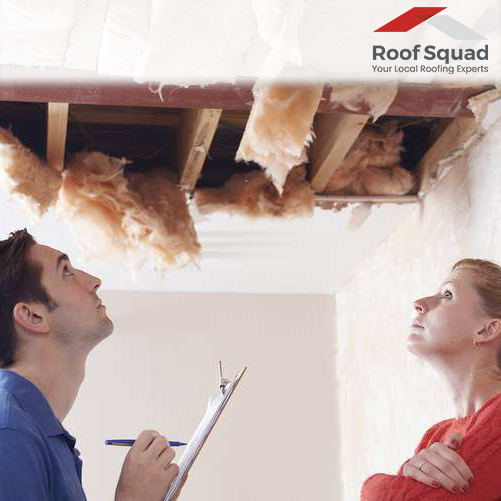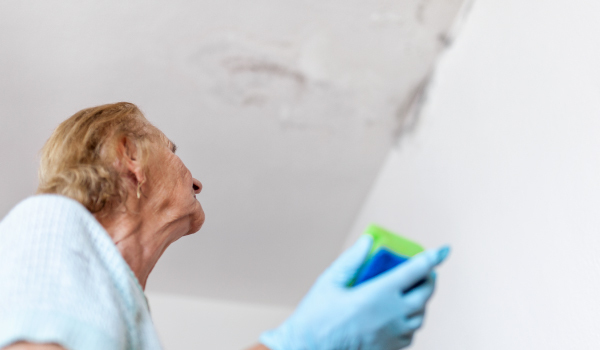When many homeowners discover roof leaks, their first question is, will homeowners insurance cover it? Unfortunately, the answer is often a lot more confusing than just yes or no. Generally, homeowners insurance is required by most lenders and is designed to cover sudden unexpected damages.
When many homeowners discover roof leaks, their first question is, will homeowners insurance cover it? Unfortunately, the answer is often a lot more confusing than just yes or no. Generally, homeowners insurance is required by most lenders and is designed to cover sudden unexpected damages.

Though you may not expect a leak to occur, many homeowners insurance policies do not think the same way. So, let’s take a look at the situations when homeowners insurance will cover roof leaks, when they won’t, and how to deal with your leaking roof before more damage occurs.

Homeowners insurance often covers roof leaks, but not always. The best way to find out what your insurance covers is to check your policy. Ideally, you should check a policy before you buy it to see if you’re happy with the coverage.
Most homeowners insurance policies cover damages due to fire, vandalism, electrical surges, pipes bursting, AC freezing, heavy snow cover, and many other types of sudden, unexpected damage.
It’s possible repairing your leaky roof is covered by your homeowners insurance, but it really depends on what caused the leak. Every homeowner would like their repairs to be covered by insurance since roof repairs are expensive. However, unfortunately, leaks resulting from some of the more common causes are often not covered by insurance. If your roof leak was caused by storm damage, the repairs would likely be covered. Leaks caused by vandalism will probably be covered as well.
However, if your leak occurred as a result of wear and tear over time, your repairs will probably not be covered because you are expected to take care of routine maintenance. Also, if your roof is more than 20 years old, it will likely be considered too old to be repaired. So, any claim is likely to be denied. This is a common cause of denial for roof repair claims. A typical asphalt roof lasts about 20 years. Beyond this time, the insurance company may expect you to replace your roof.
Additionally, there are some other types of damage that don’t tend to be covered by homeowners insurance. Damages dues to pests, flooding, earthquakes, and mold are often not covered. Although, you could see if you can buy an additional policy to cover these sorts of damage.
However, even if you don’t have a policy that covers roof leaks, the water damage resulting from the roof leaks may still be covered. This is true because many leaks are caused by the wear and tear of your roof over time. Yet, even though insurance companies generally don’t cover these leaks, most policies do cover water damage that results from wear and tear since this is frequently the cause of water damage. However, since insurance companies do cover this, they may want to inspect your roof periodically to make sure you are maintaining it.

You can always file a claim for a roof leak if your homeowners insurance covers your situation. But, consider whether or not you should. Depending on the details or your situation, filing a claim may not necessarily be in your best interests. One thing you’ll want to check is the deductible for your policy.
Check carefully because your policy could have more than one deductible. So, make sure you find the one that applies to your situation. For instance, the deductible for storm damage may be different than the deductible for routine damage.
Once you find your deductible, see if the deductible is higher than the cost of the repairs. If it is, it’s probably not worth filing a claim. Filing an insurance claim can increase your premiums and make it harder to get homeowners insurance in the future, especially if you’ve made other claims. It may even be worth paying for the repairs out of pocket if they are not too expensive. This would help you avoid higher premiums and possibly preserve your ability to get homeowners insurance in the future.

You can help prevent water damage and keep your roof in good shape by looking out for leaks and responding quickly if you find any. Look for any water stains on your ceilings or even running down your wall. This could indicate a leaky roof. You’ll want to find where the leak is coming from since the leak likely caused water damage or even mold.
Checking the ceiling and walls on upper floors is particularly important since that is where you’re likely to see leaks first. So, keep an eye out upstairs even when you don’t think you have a leak.
Try to check your roof regularly. The best way to do this is to have periodic inspections from a roofing contractor. Then, if your roof needs any repairs, you can have them done quickly.
Most people don’t want to climb up on their roof to try to temporarily cover the leak. However, you can take a few steps to limit the damages while waiting on the roofing contractor.
It may be tempting to start repairs right away; no one wants to have their roof continue leaking. But, if you’re planning on filing a claim, you’ll want to do so first. It’s best to just try to limit any damage and file your claim before starting repairs. Contacting the insurance company will also allow you to find out if you’re leak is covered by your policy. The insurance company may limit your choice of contractors if they do cover the repairs. It’s also possible they may want to replace your roof rather than repair it. You’ll want to find these things out before starting repairs. Although, you may want to have the roof tarped to prevent further damage.
However, take pictures of all damages before making any temporary repairs. Also, keep the receipt for the tarping as well as any other expenditures related to preventing further damage.

Roof leaks develop for a variety of reasons. You may have an animal infestation or have damage from a bad storm. Wear and tear over time can also cause your roof to leak. It’s really hard to prevent any damage from happening to your roof, especially as your roof ages. Roof leaks may happen occasionally, but you can limit the damage through quick action.
You can promptly contact a roofing contractor to inspect your roof and evaluate any damages. Then, once the roofing contractor goes over your options, you can choose an option that protects your house and suits your budget. You may have very little out-of-pocket expenses and your insurance covers the repairs.
Generally, homeowners insurance will not cover roof leaks that occur due to age or a lack of maintenance. However, for leaks due to sudden unexpected damage such as hail, fire, or other disastrous events, there is a good chance it may be covered.
The best way to tell for sure is to check with your insurance provider to see if the damage is covered and consider if it is worth it to make a claim. Then contact Roof Squad; we can help you to plan the most affordable option to repair the leak. We can then help you work with your insurance company, help you to file your claim, and get your roof repaired fast.
-thumbn.jpg)
Here's what homeowners need to know about this common roof problem.
Read More
When it comes to roofing, there's a wide variety of options to consider, each with its own unique characteristics and benefits.
Read More
Don't neglect routine roof maintenance—it's essential for protecting your investment and avoiding costly repairs.
Read More